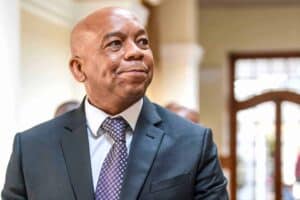City of Tshwane aims for load shedding relief by 2026, but faces skepticism over execution despite an energy summit.

Plans by the City of Tshwane to rid its residents of load shedding by 2026 is a good idea. But at the moment, it seems to be all talk and no action.
Last week the city, in partnership with the Tshwane Economic Development Agency, hosted the Tshwane Energy Summit which saw 360 delegates and 18 exhibitors turn up to help it develop strategies to address the energy crisis.
Tshwane mayor Cilliers Brink said the successful summit would help the metro prepare for future load shedding.
ALSO READ: Rates hikes leave no space to breathe
“This landmark event was critical to fast-tracking the city’s energy plans to reduce our reliance on Eskom. The city is leading efforts to lease out the Pretoria West and Rooiwal power stations to the private sector and is also engaging independent power producers for expertise on generating alternative green energy.
“These two processes aim for a combined 1 000MW of energy from mixed independent sources by 2026. About 300MW is expected to come from Rooiwal, 180MW from Pretoria West and the remaining 520MW from alternative energy sources,” he said.
Supply sought
Brink acknowledged the good work by Eskom to keep the lights on, but said there was still no guarantee that prolonged load shedding would not return.
“We must do the necessary now for an energy-secure future for our metro. One of the key drivers for economic growth is a reliable supply of affordable and clean energy.
“As a large metropolitan municipality, it is important that we put a lot of work towards generating our energy to assist local industries, businesses and residents,” he said.
“The city is committed to energy independence. We have a mayoral energy task team that’s driving our agenda of energy independence by overseeing the leasing out of our power stations to the private sector and engaging independent power producers for expertise and guidance on generating alternative green energy.”
ALSO READ: Everything about prepaid electricity meters in Tshwane
An economist, Dawie Roodt, said the city’s plans to power up its grid was not only good for its economy, but also a good example as the country’s capital.
“There are many industries in Pretoria and all of them contribute to the city’s economy,” he said.
Roodt said all the industries, embassies and plants provided many jobs, contributed to the economy and would benefit from uninterrupted services.
“It would also mean a lot to the city symbolically because Tshwane is the capital of the country,” he said.
But energy expert Chris Yelland said there was still a long way to go for the power stations Tshwane was bargaining on to deliver anything, if at all, or ever.
“These are old coal-fired power stations that have been out of service for many years. About 50 years ago, it may have been possible to build a power station in the middle of a city, but today it is not possible,” he said.
Yelland said he doubted that the power plants would ever be returned to service as coal-fired power stations because of the difficulties of complying with air quality regulations.
ALSO READ: Eskom battles overloading and theft, 400 transformers replaced






